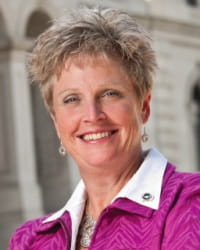School nurses do much more than wrap wounds and treat colds—and Tia Campbell ’08 is helping them transform their roles.

Tia Campbell used her capstone project to create the project “Online Orientation for School Nurses.” Photo credit: David Stover.
Life as an addiction therapist and a faculty member has intersected more than Dr. Sandra Rasmussen could have imagined. Not only is she the clinical director of Williamsville Wellness in Hanover, Va., a residential treatment center for people with alcohol, other drug, or gambling problems, she has taught at Walden for more than 13 years in the School of Health Sciences and the School of Psychology. As a published author and a board member of Walden’s Journal of Social Change and the Journal of Social, Behavioral, and Health Sciences, Dr. Rasmussen offers advice to alumni who aim to be scholar-practitioners.
HOW DO YOU INTEGRATE YOUR WORK AT WILLIAMSVILLE WELLNESS INTO THE COURSES YOU TEACH? It’s exciting to share clinical information about challenging cases with my students. For example, we see a great deal of online sports betting. It’s probably much more insidious than alcohol in terms of the brain reward. The Internet is instant, instant, instant. You can win or lose on your smartphone. Technology really enables gambling; patients report staying in their rooms for days, gambling on their computers. If I have a tough case, in confidence, I’ll share and ask my students how to manage it. In a sense, I practice what I teach every day.
WHAT IS YOUR TAKE ON THE TEACHER-STUDENT RELATIONSHIP? I address my students as colleagues. We are doing a lot of the same things in our professional lives. I try to come across as a very approachable coach, and they are the players. Inviting them to connect beyond the classroom helps them realize we are colleagues.
WHAT DO YOU HOPE TO ACCOMPLISH AS AN ADDICTION SPECIALIST? Recovery is the focus of my writing, research, and presentations. Recovery is a different, better way of life with purpose and meaning. In the field of addiction, recovery is not emphasized as much as prevention and treatment. Like I said in the title of a paper I recently wrote to become a fellow for the American Academy of Health Care Providers in the Addictive Disorders, “Recovery Is an Idea Whose Time Has Come.”
WHAT ADVICE DO YOU HAVE FOR ALUMNI? Walden students and graduates aren’t complacent. It’s an exciting time to be an instrument of social change. Continue that intensity. Experience and express it. Enrich and extend this mission beyond Walden. I really like the written word. I believe that we need to share, to disseminate our findings, our work. Publishing is one way to take it to the people. It’s work—and you may get rejection after rejection, but I think it’s a professional responsibility.
HOW HAS TEACHING AT WALDEN IMPACTED YOU? Walden’s mission of social change energizes me to practice, manage, research, and be a scholar-practitioner. It isn’t about trial and error; it’s about having a rigorously researched and sound plan for change. I’m constantly invited to be the best me I can be, and I encourage my students—past and present—to be the same.



